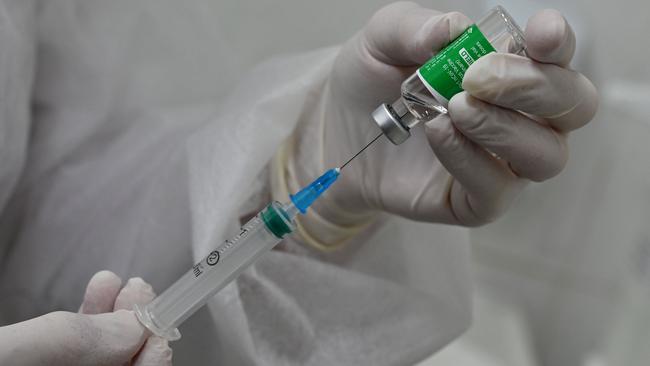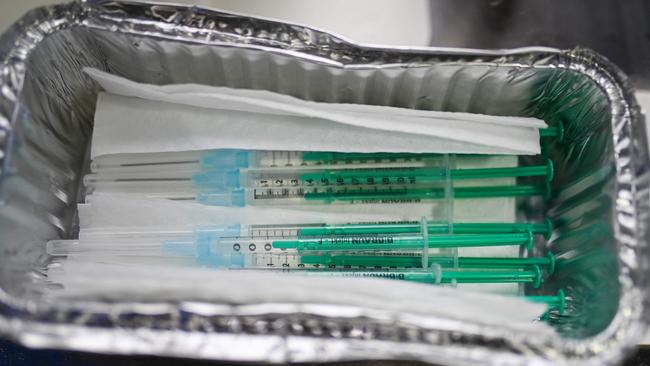EMA confirms clots as ‘very rare’ AstraZeneca Covid-19 vaccine side effect
AstraZeneca’s vaccine is ‘strongly associated’ with blood clots and mostly affects women under 60, but its benefits outweigh the risks, an urgent investigation says.

The AstraZeneca vaccine is “strongly associated” with blood clots in the brain and mostly affects women aged under 60, an urgent investigation by the European Medicines Agency has found.
In Britain, both men and women aged under 30 will now be offered an alternative vaccine to AstraZeneca because of increasing evidence the vaccine is linked to deadly clots which have killed 19 Britons, three of whom were aged under 30.
The dramatic findings out of Europe that possibly link the vaccine to very rare cases of unusual blood clots with low blood platelets could now impact on the suitability of providing the AstraZeneca vaccine for younger women in Australia.
The findings will put pressure on the federal government to follow the UK lead and readjust its vaccination strategy. Australia currently offers the Pfizer BioNTech vaccine to frontline health care workers, quarantine staff and the elderly.
“So far, most of the (blood clot) cases reported have occurred in women under 60 years of age within two weeks of vaccination,” the EMA found in its investigation. Blood clots appear to affect women at a rate of more than three times than they affect men.
EMA’s safety committee (#PRAC) has concluded its review of very rare cases of unusual blood clots with AstraZeneca #COVID19 vaccine.
— EU Medicines Agency (@EMA_News) April 7, 2021
👉https://t.co/WGsfRP8PTopic.twitter.com/aeyzK3bfxd
Dr Sabine Straus, the EMA safety committee chair, said the reporting rate of people developing brain clots, known as cerebral venous sinus thrombosis (CVST), or abdominal clotting called splanchnic vein thrombosis, was one or two per 100,000 doses of AstraZeneca.
The UK reported a rate of about one in 250,000 vaccinations.
The EMA, which uses data from across Europe as well as the UK, said up until April 4 there were 169 cases of CVST and 53 splanchnic vein thrombosis out of 34 million inoculations.
It said the latest data did not change its recommendation to continue distributing the AstraZeneca vaccine because the overall benefits of the vaccine in preventing COVID-19 transmission as well as the severity of the virus were well established and the risks were “very rare”.
Sabine Straus, PRAC Chair: “Further research and analysis of this important issue will take place. The #PRAC will continue to assess all evidence that becomes available on this issue while the vaccination campaigns continue.â€
— EU Medicines Agency (@EMA_News) April 7, 2021
However, as confidence in the AstraZeneca vaccine plummets, countries are trying to balance dealing with the pandemic amid a global shortage of all vaccines.
In Britain, younger people are now to be offered the Pfizer BioNTech or Moderna vaccines.
England’s deputy chief medical officer Profess Jonathan Van-Tam said the UK was embarking on a “course correction” for 18- to 29-year-olds, which he insisted wouldn’t impact on the overall plan to vaccinate all adults by the end of July, pending Pfizer and Moderna deliveries.
Dr June Raine, head of the British drugs regulator, MHRA, said: “Based on the current evidence, the benefits of the AstraZeneca vaccine against COVID-19 and its associated risks — hospitalisation and death — continue to outweigh the risks for the vast majority of people. Our review has reinforced that the risk of this rare suspected side effect remains extremely small.”
MHRA issues new advice concluding a possible link between #COVID19 Vaccine #AstraZeneca & extremely rare, unlikely-to-occur blood clots.
— MHRAgovuk (@MHRAgovuk) April 7, 2021
Vaccines are the best way to protect people from #COVID19 & the benefits continue to outweigh any risks.
Read more: https://t.co/6aDMYhBEVppic.twitter.com/FVxxm8a3A1
The EMA concurred and said unusual blood clots with low blood platelets should be listed as a very rare side effect of the AstraZeneca vaccine.
Australia also has access to Pfizer BioNTech vaccine, but so far only one million doses — out of a total of 20 million on order — have arrived in the country.
The EMA’s investigation centred on 18 fatalities in 62 cases of CVST and 24 of splanchnic vein thrombosis that had appeared in Europe up to March 22.
The EMA said it was also intensively monitoring the one-shot Johnson & Johnson vaccine, which uses similar adenovirus vector technology to the AstraZeneca vaccine.
Dr Peter Arlett, the EMA head of data analytics, said during Johnson & Johnson clinical trials, there was early signs of venuous thrombosis and since then there have been three cases of blood clots with low platelets, but the overall numbers were extremely small.
Scientists believe one plausible explanation for the combination of blood clots and low blood platelets is an immune response, leading to a condition similar to one seen sometimes in patients treated with heparin (heparin induced thrombocytopenia).
They do not have any data to suggest that the contraceptive pill or pregnancy is a factor in the clotting. Another theory, that the clotting is a result of the vaccine being accidentally injected into the vein rather than the muscle, has been discounted because experts say the amount of vaccine is so tiny, Dr Straus said.

Finland, Sweden, Lithuania only give the AstraZeneca vaccine to those aged over 65. Germany has already banned the AstraZeneca vaccine for under 60s while France has banned it for under-55s and Iceland for under under-70s. The vaccine is banned altogether in Denmark, Norway, the Netherlands and Latvia.
People who have had a coronavirus injection are urged to seek urgent medical treatment if they suffer a shortness of breath, chest pain, leg swelling, persistent abdominal pain, neurological symptoms, such as severe and persistent headaches or blurred vision or tiny blood spots under the skin beyond the site of the injection within two weeks of receiving the jab.




To join the conversation, please log in. Don't have an account? Register
Join the conversation, you are commenting as Logout